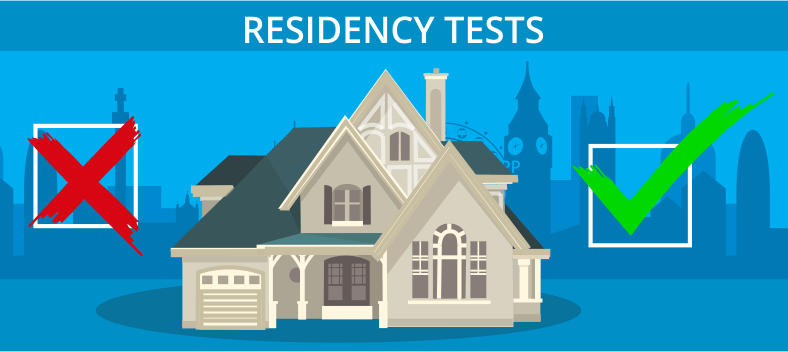Residency Tests: working out your status
HMRC's statutory residence test is designed to provide greater certainty as to whether or not individuals are UK resident for tax purposes. The rules are somewhat complex, so it may be advisable to get professional advice to determine residency status. Take the DNS test now and then contact us if you're in any doubt and we'll help you.
Bear in mind that it may be worth someone who has previously been considered to be non-UK resident to seek advice about whether s/he becomes UK resident with effect from 6 April 2013.

Who needs to take action?
- Anyone who lives outside the UK who intends to visit after 6 April 2013;
- Aircrew need to make themselves aware of the specific rules for their industry;
- If you are currently non-resident and complete a UK Tax Return;
- Those looking to leave the UK and subsequently being considered non-resident should be aware of the new legislation relating to splitting the tax year of departure and new temporary non-residence rules;
- Anyone planning on returning to or leaving the UK after 6 April 2013, it is no longer a clear-cut case of being treated as resident or non-resident only from the point of your arrival. Split-year treatment is now specifically defined.
There are a number of stages to the test and a variety of rules apply to determine status.
The Automatic Overseas test
This part of the test must be passed before proceeding to the next parts, since if in this part of the test the individual is considered to be non-UK resident then s/he need not proceed any further.
PART A: Automatically Non-Resident
You are non-resident if you answer yes to any of the following questions:
- If you were resident in the UK for one or more of the previous three tax years did you spend fewer than 16 days in the UK in the tax year? Yes/No
- If you were not resident in the UK for any of the three preceding tax years did you spend fewer than 46 days in the UK in the tax year? Yes/No
- Did you work full time overseas throughout the tax year without any significant breaks? (Note: there is a calculation to define full time/significant breaks, so call DNS for further advice if you think this applies to you);
And:
- Did you spend fewer than 91 days in the UK in the tax year? Yes/No
- Did you work for less than 31 days for more than three hours a day in the UK in the tax year? Yes/No
If you answered "Yes" to any of these questions then you are automatically non-resident and you should not continue the test.
If you have answered "No" to any of these question then you are not conclusively non-resident. Please move to the next level, the Automatic Residence Test
PART B: Automatically Resident
You are resident if you answer yes to any of the following questions:
- Did you spend 183 days or more in the UK in the tax year? Yes/No
- Did you have a home in the UK during all or part of the tax year in which you spend a sufficient amount of time (to meet this test you must have at least one period of 91 consecutive days; at least 30 of which fall in the tax year);
- Have no overseas home; or, Yes/No
- Have an overseas home or homes in each of which you spend no more than a permitted amount of time (Note: there is a calculation to define permitted amount of time, so call DNS for further advice if you think this applies to you)? Yes/No
- Did you work full time in the UK for any period of 365 days, with no significant break from working in the UK?
And either you:
And:
- Did all or part of the 365-day period fell within the tax year? Yes/No
- Were more than 75% of the of the total number of days in the 365-day period when you worked more than three hours a day, days when you did more than three hours of work in the UK? Yes/No
- At least one day in the tax year is a day on which you did more than three hours of work in the UK? (Note: this test is complex and you should contact DNS for more advice) Yes/No
PART C: Sufficient Ties
If you are not conclusively resident or non-residentaccording to the test then the "Sufficient Ties" test is used to determine your residence status for a tax year.
To determine your residence status this test considers a further five ties to the UK together with the number of days spent in the UK.
Five elements make up the "Sufficient Ties" test:
- If you were non UK resident for any of the preceding three tax years you will need to consider the first four ties
- If you were resident in the UK for one or more of the three preceding tax years you will also need to consider the fifth tie.
Five connecting ties:
- Family: do you have a spouse, civil/ common law partner, or minor children in the UK? Yes/No
- Accommodation: do you have accommodation in the UK which is available for a continuous period of at least 91 days (ignoring breaks of less than 61 days) and you spend at least one night there? Yes/No
- Substantive work: do you spend 40 working days or more (a working day is defined as more than 3 hours of work) in the UK? Yes/No
- Presence in the previous two tax years: did you spend more than 90 days in either of the previous two tax years in the UK? Yes/No
- Did you spend more days in the UK in a tax year than in any other single country? (This applies to leavers only and is designed to identify leavers who do not take up residence in any other country following a period of UK residence).
And:
The number of days you spend in the UK in a tax year will dictate the number of UK ties that are needed for you to be UK resident.
The table below shows how many ties need to be present for you to be resident or non-resident in the UK, this depends on the number of days spent in the UK and also whether you are an ‘arriver’ or a ‘leaver’.
| days spent in the uk | arrivers: not resident in the uk in the previous 3 tax years | leavers: resident in the uk in at least 1 of the previous 3 tax years |
|---|---|---|
| Less than 16 | Always non-resident | Always non-resident |
| 16–45 days | Always non-resident | Resident only if at least 4 ties apply |
| 46–90 days | Resident only if at least 4 ties apply | Resident only if at least 3 ties apply |
| 91–120 days | Resident only if at least 3 ties apply | Resident only if at least 2 ties apply |
| 212–182 days | Resident only if at least 2 ties apply | Resident only if at least 2 ties apply |
| 183 days or more | Always resident | Always resident |
"Split" tax years
The statutory residence test is designed to determine residence status for the whole tax year. However, if part way through a tax year, you leave the UK to live or work abroad or come from abroad to live and work in the UK, and certain conditions are met, the tax year will be "split" into two parts. In one part of the tax year you will be treated as UK resident and in the other part you will be treated as non-UK resident.
If a similar scenario might apply to your own circumstances, it is important to seek advice from a tax specialist, so contact DNS.
Also See: Outsourced Bookkeeping and Accounting
Any questions? Schedule a call with one of our experts.








